At least you’re not Mike Bloomberg on this Wednesday morning! Poor guy spent half a billion dollars for the right to be embarrassed in two nationally televised debates, relitigate a bunch of sexual harassment allegations against him, and come out of Super Tuesday hitting the delegate threshold in only a handful of states. He did win in American Samoa, though.
(If you are Mike Bloomberg, thanks for reading, Mr. Mayor! You can become a full member of The Dispatch and enjoy a series of perks—including the ability to comment on stories, midweek G-Files and French Presses, and more—just by clicking here.)
Quick Hits: Today’s Top Stories
U.S. coronavirus deaths now stand at nine, and the White House announced Tuesday that the CDC would lift all restrictions on testing for anyone who suspects they could have the virus.
The Trump administration, spooked by the possibility of a coronavirus-sparked economic downturn in an election year, is mulling a number of economic stimulus proposals in a bid to keep markets shipshape. The Federal Reserve cut interest rates half a percentage point on Tuesday—the largest emergency cut since the financial crisis—but the Dow still fell almost 3 percent on the day.
A United Nations watchdog said Tuesday that Iran has nearly tripled its stores of enriched uranium since November, putting it close to the amount it would need to produce a nuclear weapon.
In a 5-4 decision, the Supreme Court widened states’ abilities to prosecute illegal immigrants for identity theft Tuesday.
Joe Biden Is Back
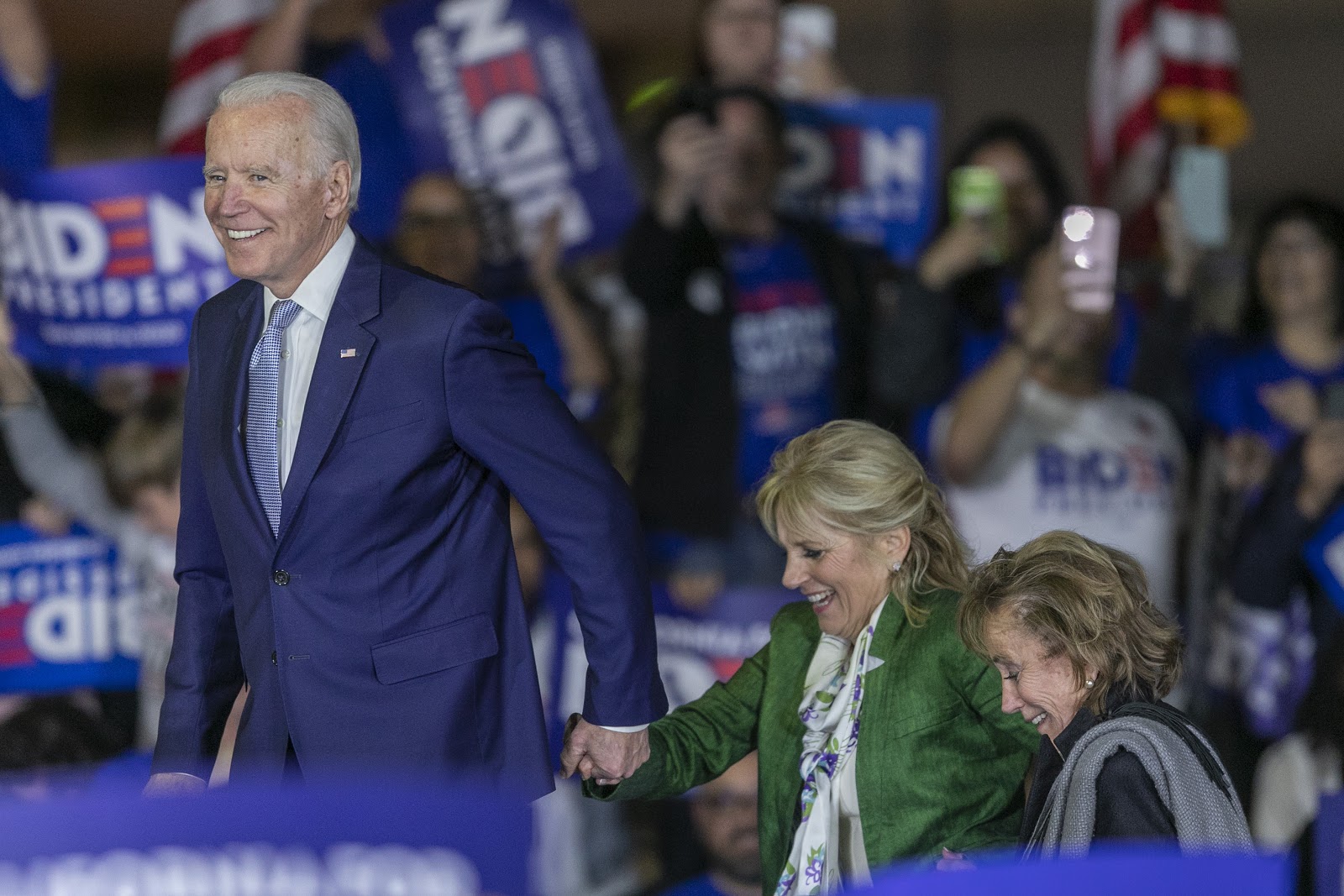
Less than a week ago, the 2020 Democratic presidential primary was beginning to look eerily like the GOP contest in 2016. Bernie Sanders, the race’s belligerent outsider, had built up a head of steam in early states and was consolidating his position with a plurality of voters. A sizable majority of voters preferred someone else, but the race lacked a standout for them to rally around, and the other major candidates seemed content to press their own chances rather than join forces to stop the frontrunner.
Then South Carolina changed everything. After months of telegraphing weakness and hemorrhaging support, Joe Biden finally put a big win on the board. That was all it took. Two other top-flight candidates, Pete Buttigieg and Amy Klobuchar, bowed out at once and threw their weight behind the former vice president. As Super Tuesday dawned, a race that had previously featured a leftist standard-bearer and a fragmented center suddenly looked like a fair fight with two major candidates left in each camp: Bernie Sanders and Elizabeth Warren way out left, Joe Biden and Mike Bloomberg somewhat less so.
The result: Biden mopped up, winning 10 states and surging into the delegate lead. (How substantial of a lead remains to be seen, and will depend largely on Sanders’ final victory margin in California, which is typically slow to report its results.) He crushed Sanders in states like North Carolina and Virginia—by 18 points and 30 points, respectively—and pulled out convincing surprise victories in states with ostensibly more progressive Democratic bases like Minnesota and Texas, where he no doubt benefitted from last-minute endorsements and home-state support from Klobuchar and Beto O’Rourke, respectively.
The results show Team Biden that two issues that looked like substantial threats to his campaign in recent weeks have proved insubstantial.
The first is the threat of Mike Bloomberg. After the megabillionaire and former New York City mayor jumped into the race back in November, it looked as though he’d dealt Biden a death blow: Backed by an insane $500 million of his own money, he surged to nearly 20 percent in national polling just as primaries began in earnest last month. Most of that support seemed to come at Biden’s expense.
But after struggling mightily in a pair of debates, Bloomberg lost his brief and tenuous constituency: He failed to place in the top two in a single Super Tuesday state. His consolation prize: five delegates from American Samoa, which also awarded Rep. Tulsi Gabbard, who was born there, one. Tuesday shows Biden can still perform strongly with Bloomberg around; if Bloomberg drops out, presumably he only gets stronger.
The second danger was the question of how well the unification of the non-Sanders field would work. Although most observers saw Klobuchar and Buttigieg as competing for the same voters as Biden, there was actually some evidence to indicate that just as many of their supporters might defect to Sanders. A recent Morning Consult poll, for instance, suggested that a small plurality of Buttigieg’s supporters considered Sanders to be their second choice. That appears not to have mattered either.
The news wasn’t all bad for Bernie Sanders on Tuesday. Significant wins in California and Colorado cemented his position as the race’s only really viable leftist candidate and kept him within arm’s length of Biden in total delegates. And Biden’s sudden show of strength may play to Sanders’s advantage in another counterintuitive way: Gobsmacked leftists are increasingly out of patience with Elizabeth Warren’s continued presence in the race. Rep. Ilhan Omar, one of Congress’s most prominent young progressives, tweeted Tuesday night that a “united progressive movement” would have allowed Sanders to “win MN and other states we narrowly lost.”
But Tuesday also confirmed a deeper problem for Sanders: His theory of the race simply doesn’t seem to be working.
For years now, his philosophy has gone like this: The reason masses of working-class people don’t vote in America is because most politicians are backscratching, capital-serving establishmentarians who these voters don’t believe will materially improve their lives in any meaningful way. But those people could be reached and tapped into by a candidate with a trustworthy record, a powerful campaign machine, and an uncompromisingly pro-worker agenda—a role for which Bernie Sanders was uniquely suited. Alienating some moderates and independents in the general election wouldn’t matter, the theory ran, because the Bernie revolution would activate and mobilize previous nonvoters in such great numbers.
On Super Tuesday, turnout was indeed up—but not in the ways Sanders needed. Many of those casting their first Democratic primary ballots are the same type of voters Democrats tapped to win back the House last year: newly Dem-curious suburbanites who broke primarily for Biden. Turnout among young voters, meanwhile, remains low—below, in fact, 2016 in many states. That needs to change for Sanders to have a shot.
One more thing: There weren’t a lot of surprises down ballot last night. Jeff Sessions and Tommy Tuberville will head to a runoff for the Republican Senate nomination in Alabama to face Democratic incumbent Doug Jones in November—the most likely pickup seat for Republicans this fall. On the Democratic side, the establishment candidates prevailed in a number of primaries—Cal Cunningham, an Army veteran and former state legislator, won in North Carolina; MJ Hegar, another combat veteran, ran well ahead ahead of the AOC-endorsed candidate in a 12-person primary and will advance to the runoff to take on John Cornyn in Texas; and in California's 25th Congressional District's special election to replace Katie Hill, it looks like Democrat Christy Smith and Republican Mike Garcia appear headed for a runoff.
Speaking of Democracy...
Freedom House—the non-governmental organization founded in 1941 to research and promote democracy, political liberty, and civil rights around the globe—released the 2020 iteration of its annual “Freedom in the World” report today. The Dispatch received an advance copy.
The report, written by Sarah Repucci, finds that “democracy and pluralism are under assault,” with 2019 representing “the 14th consecutive year of decline in global freedom.”
“The unchecked brutality of autocratic regimes and the ethical decay of democratic powers are combining to make the world increasingly hostile to fresh demands for better governance.”
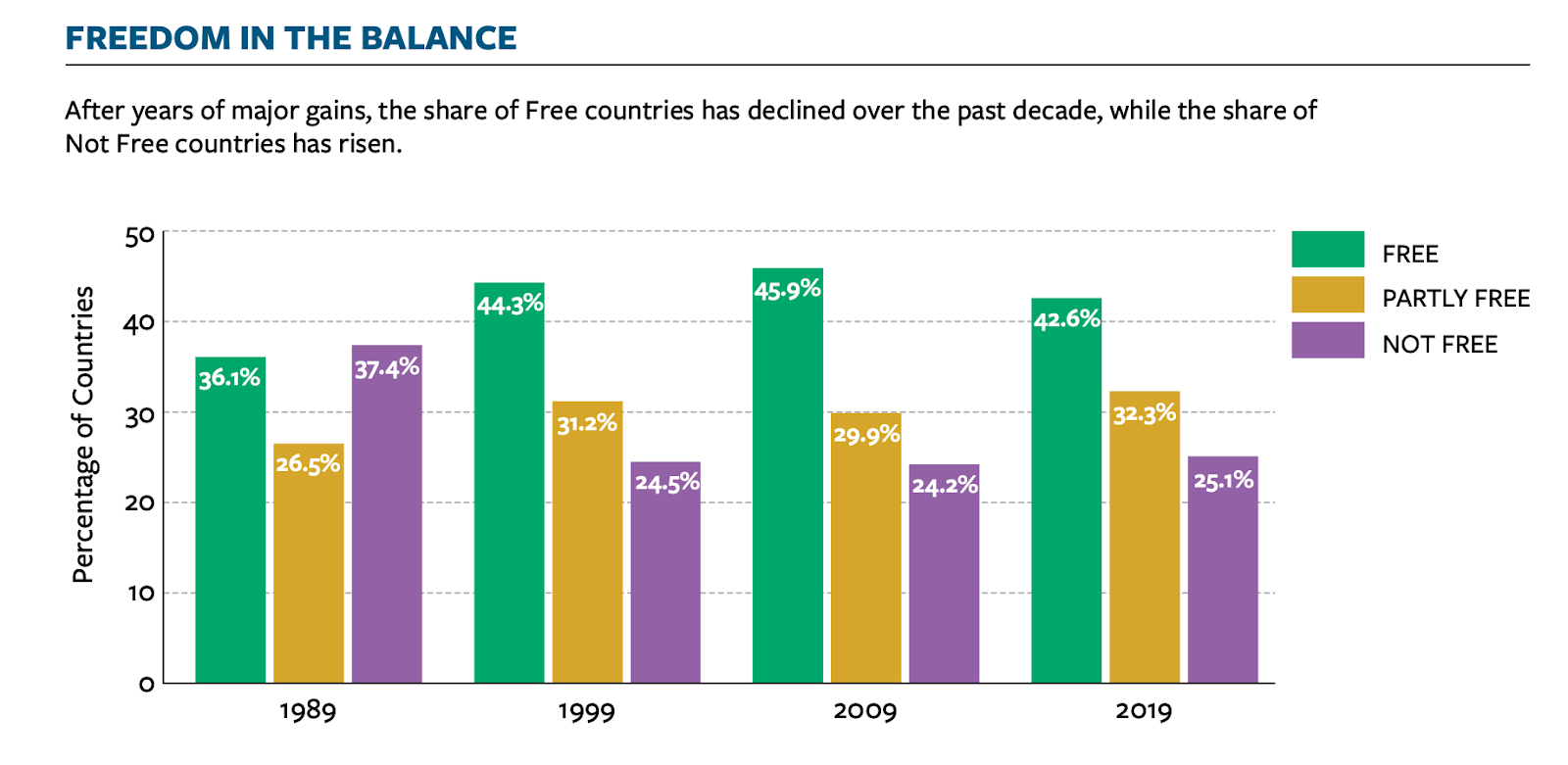
Repucci zeroes in on India and China as presenting particular cause for concern. “Almost since the turn of the century, the United States and its allies have courted India as a potential strategic partner and democratic counterweight to China in the Indo-Pacific region,” the report states. But “the Indian government’s alarming departures from democratic norms under Prime Minister Narendra Modi’s Bharatiya Janata Party (BJP) could blur the values-based distinction between Beijing and New Delhi.”
Under Modi, the Indian central government has cracked down on the semi-autonomous status of Jammu and Kashmir—the only Muslim-majority state in the subcontinent—sending in troops and restricting internet service. It published a citizens’ register in the state of Assam and passed the Citizenship Amendment Law that “expedites citizenship for adherents of six non-Muslim religions from three neighboring Muslim-majority countries.”
China’s Communist Party has engaged in a “campaign of cultural annihilation” against Uighurs—an ethnic minority in northwestern China—and other Muslim minorities. “Mass violations of the basic freedoms of millions of Uighurs … continued in 2019,” the report says, “with hundreds of thousands of people sentenced to prison or detained for forced indoctrination. The crackdown also included forced labor, the confinement of detained Muslims’ children in state-run boarding schools, and draconian bans on ordinary religious expression.”
“Beijing claimed in December that the mass detentions had ended, but evidence from leaked government documents and victims’ relatives contradicted the assertion.”
The United States and other world leaders have made “some important diplomatic statements” against this repression, Repucci writes, but “in general the world’s democracies have taken few steps to rally international opposition or apply meaningful collective pressure to halt China’s rights abuses, and elected leaders in Europe and elsewhere have often been tepid in their public criticism.”
Which brings us to the United States. “Democracy advocates around the world have historically turned to the United States for inspiration and support, and Congress has continued to fund programs to that end in practice,” the report argues. “To date, however, the Trump administration has failed to exhibit consistent commitment to a foreign policy based on the principles of democracy and human rights.”
Repucci positively cites President Trump’s condemnations of authoritarianism in Venezuela, Iran, and Hong Kong, but says he “has excused clear violations by traditional security partners such as Turkey and Egypt” and “given a pass to tyrannical leaders whom he hopes to woo diplomatically, including Vladimir Putin of Russia and Kim Jong-un of North Korea.”
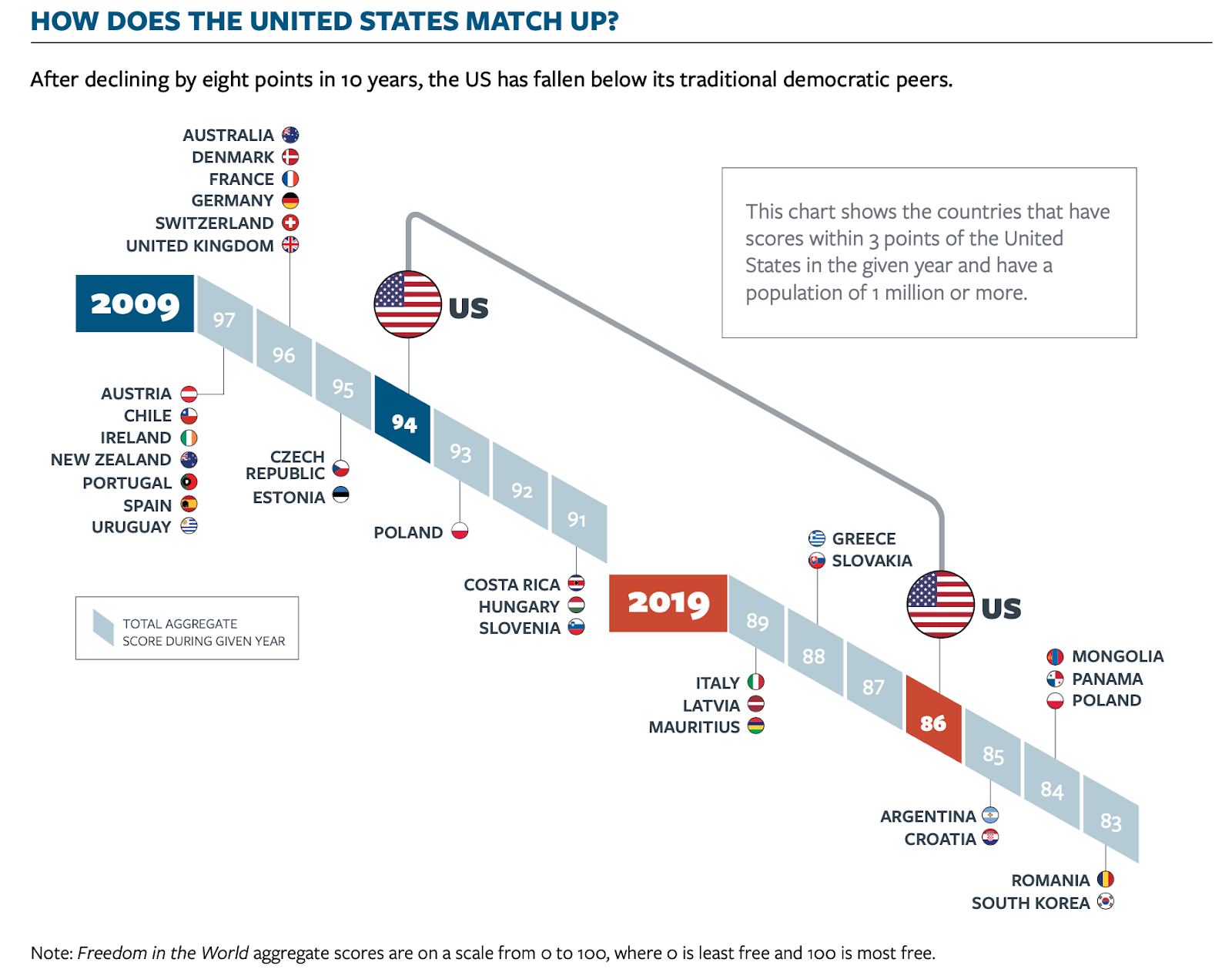
Domestically, “fierce rhetorical attacks on the press, the rule of law, and other pillars of democracy coming from American leaders, including the president himself, undermine the country’s ability to persuade other governments to defend core human rights and freedoms, and are actively exploited by dictators and demagogues.”
The report—which you can (and should) read in full here—concludes we are living in “a world without democratic leadership,” but offers a series of recommendations democracies can take to help fill this vacuum, including: investing in civic education, requiring social media companies to report foreign efforts to spread online disinformation, emphasizing democracy-strengthening programs in foreign assistance, and imposing targeted sanctions on individuals and entities involved in human rights abuses.
Worth Your Time
When American conservatives largely made their peace with Donald Trump in the days leading up to the 2016 election, one huge reason was his pledge to nominate pro-life judges to the Supreme Court. Two SCOTUS appointments later, pro-life conservatives are waiting with bated breath to see what fruit that promise might yield. As the Supreme Court moves to consider a Louisiana abortion law this week, this Robert Barnes Washington Post piece is a good primer on the situation and an interesting look at some of the state legislators, including pro-life Democrats, who have brought things to this point.
Fair warning: This one’s a little jargony, but fascinating nonetheless. In recent years, election journalism has gotten hooked on big data, with probabilistic model forecasting (election needles and the like) occupying a bigger and bigger place in how elections are presented to the news-consuming public. But does that presentation itself affect the public’s voting habits? A new study published last week in the Journal of Politics suggests indeed it does: probabilistic models, they find, chill voter turnout by “decreasing the impression that an election is competitive.”
Presented Without Comment: Super Tuesday Edition
Presented Without Comment: ‘Peace Deal’ Edition
Toeing the Company Line
In David’s latest French Press (🔒), he dissected just exactly what Bernie Sanders is proposing ($60 trillion in government spending over the next 10 years), and why it won’t happen, even if he does win the election. “Presidents alone cannot revolutionize our nation’s economy or its laws. They can often nudge, but they can rarely shove.” Be sure to check out the whole thing here!
Jonah is joined by AEI’s Michael Strain on the latest episode of The Remnant to discuss the state of the American dream, the coronavirus, and Star Trek: Picard. Tune in here!
Now that impeachment is well behind us, we can look at it with a little more circumspection. On the website today, Daniel Vaughan looks at where it went wrong for the Democrats.
Let Us Know
Shortly after former FBI director James Comey endorsed Joe Biden yesterday, Andrew Bates—the Biden campaign’s director of rapid response—made clear the former vice president wasn’t interested in Comey’s support.
Our question to you: Which would be the most damaging endorsement in the Democratic primary?
Mike Bloomberg
Omarosa
Jonah Goldberg
Hillary Clinton
Anthony Scaramucci
Reporting by Declan Garvey (@declanpgarvey), Andrew Egger (@EggerDC), Sarah Isgur (@whignewtons), and Steve Hayes (@stephenfhayes).
Corrections: Yesterday’s Morning Dispatch originally referred to Shermichael Singleton as the “lone black panelist” at the Principles First conference. He was one of two. Also, the newsletter originally referred to former California Rep. Katie Hill as California Rep. Katie Porter.
Photograph of Joe Biden by David McNew/Getty Images.
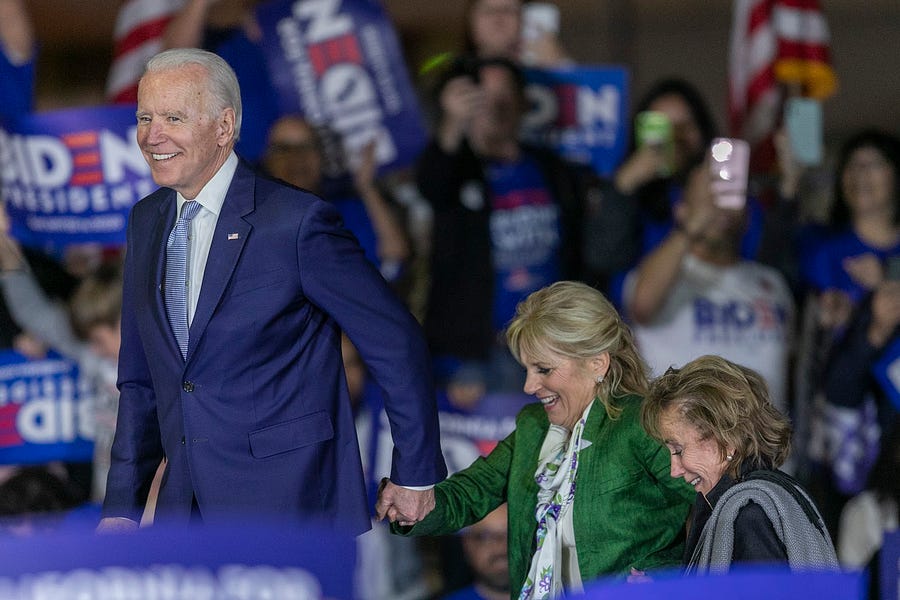





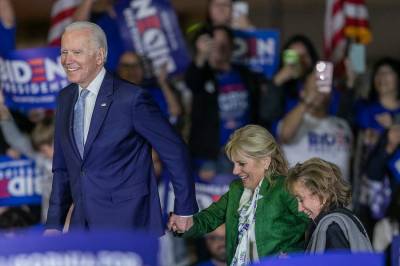
Please note that we at The Dispatch hold ourselves, our work, and our commenters to a higher standard than other places on the internet. We welcome comments that foster genuine debate or discussion—including comments critical of us or our work—but responses that include ad hominem attacks on fellow Dispatch members or are intended to stoke fear and anger may be moderated.
With your membership, you only have the ability to comment on The Morning Dispatch articles. Consider upgrading to join the conversation everywhere.